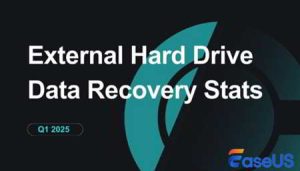EaseUS Critical Insights into External Hard Drive Data Recovery in Q1 2025 Report
Report covers over 3 million samples WW, delving into data recovery from external hard disks from multiple dimensions, including storage capacity, brand reliability, and disk type.
This is a Press Release edited by StorageNewsletter.com on June 3, 2025 at 2:00 pmEaseUS has just released a report for Q1 2025, highlighting critical trends and insights into external hard drive data recovery.
External hard drives (including HDD and SSD) are portable and have large-capacity storage capabilities. They are widely used in the storage and transmission of daily office documents, the archiving of home photos and videos, and the file management of multimedia projects. However, the threat of data loss remains a significant concern. This report covers over 3 million samples WW, delving into data recovery from external hard disks from multiple dimensions, including storage capacity, brand reliability, and disk type.
Key findings include:
- Small Drives, Big Risks: Avoid Data Loss with Larger Capacities
Data shows that the probability of data loss for small-capacity external drives with a capacity of less than 64GB is 4 times that of large-capacity drives with a capacity of over 4TB. This significant vulnerability mainly stems from frequent use in complex environments, improper user operation (such as not safely ejected devices), and hardware limitations (such as using low-quality components when manufacturing small-capacity drives).
SSDs show a similar trend but with less pronounced differences. Small-capacity SSDs below 256GB face double the risk of data loss compared to those exceeding 4TB. Frequent RW operations and weaker controller performance in smaller SSDs contribute to higher failure rates.
- Trust in Top Brands: WD, Seagate, and Samsung Offer Outstanding Protection
Brand reliability significantly impacts data protection. Leading brands like Western Digital, Seagate, and Samsung have demonstrated greater stability and advantages in preventing data loss. When making a choice, users should pay more attention to the overall quality and security performance of their products. - SSDs Trump HDDs: SSDs Ensure Better Data Security
Traditional mechanical HDD)experience a 40% higher data loss probability than SSDs. SSDs’ architecture, lacking mechanical components, provides better shock resistance and stability, significantly reducing data loss risks.
This data statistics is not merely related to numbers; it also provides practical tips for users to protect external hard disks and files, emphasizing the importance of choosing the right hardware, safe usage practices, and effective backup strategies. Suggestions include giving priority to the advanced technologies and quality control of well-known brands, using the exFAT file system for SSDs to avoid TRIM-related data zeroing, leveraging cloud services for dual protection, and applying final data recovery software to rescue critical data effectively.
This report is as an essential guide for IT professionals and enthusiasts, designed to foster a proactive approach to safeguarding digital assets.
EaseUS encourages all readers to explore the full report, implement the recommended practices, and share vital information within networks.










 Subscribe to our free daily newsletter
Subscribe to our free daily newsletter

